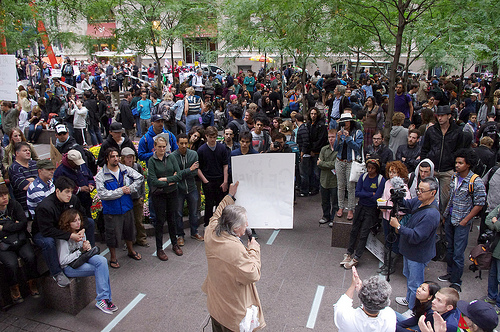The Occupy Wall Street protest that began in Zuccotti Park in New York City has now spread to hundreds of communities around America. Although the aims of the protesters are a little vague, and the sustainability of the movement unknown, one thing seems clear: A lot of people are angry about the state of our nation and especially the state of our politics.
The protesters are unhappy about the inequality of wealth, the influence of money in politics, and the fact that those responsible for the financial crisis have paid no price for the damage they inflicted on others. It would be easy to dismiss the protests as the rantings of a very small and disaffected minority. But a Time magazine survey shows that a majority of the public has a favorable impression of the movement.
More fundamentally, the Occupy Wall Street movement suggests that American attitudes are changing. It is not as if people’s objective circumstances have suddenly deteriorated. After all, the inequality of incomes is not new. It has been increasing since the 1970s. Nor is the stagnation of middle-class incomes new. Middle-class incomes grew at a tepid pace between the late 1970s and the beginning of this decade, and what growth there was only came about because more women went to work. These incomes have subsequently been flat or declining. Both of the last two economic downturns were followed by jobless recoveries and even the most recent financial crisis and the deep recession that followed in its wake is now almost four years old.
Attitudes undoubtedly shift with a lag. But what’s emerging in the wake of all this bad economic news, I think, is the idea that America is no longer an opportunity society. As someone who has studied poverty, inequality, and social mobility for many years, I have always been fascinated by the apparent tolerance in the United States for a huge gap between rich and poor. Survey data from a few years ago show that this tolerance has been due to the American public’s strong belief that you can be poor today but rich tomorrow, that your children will do better than you, and that anyone who works hard and has a certain amount of talent can make it in America. These attitudes have contrasted sharply with those in Europe where the public has been much less optimistic about the role of individual effort and more willing to turn to government to help the less fortunate.
Now it seems many Americans have decided that playing by the rules doesn’t work. More and more they are coming to believe that the system is rigged against them, the deck stacked in favor of Wall Street and against Main Street.
Whatever their attitudes, the new reality is that they may be right—not just about income inequality and the role of money in politics but also about the extent of opportunity in America. It is narrower than most people assume. A child born into an advantaged family in the United States (one from the top fifth of the income distribution) has twice the chance of achieving the American Dream (a middle class income or better) than a child from the bottom fifth.
Are people’s chances of climbing the ladder becoming more difficult? No one can say for sure. But a lot of evidence points in that direction. Interesting research done by Bhashkar Mazumder, a staffer at the Chicago Fed, finds that family background is becoming a stronger influence on where children end up in adult life. In short, class matters. So perhaps Mitt Romney is right when he calls the protests “class warfare.” They reflect not so much an envy of those who have made it on their own, but rather a resentment that the deck is stacked against those who don’t have the right cards to begin with. It is not the outcomes they complain about but the fact that the game itself is not fair.
Photo Credit: david_shankbone
Click to
View Comments